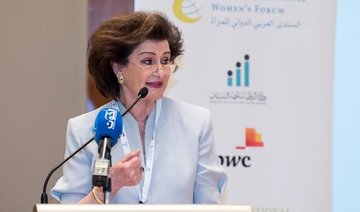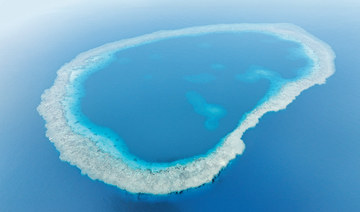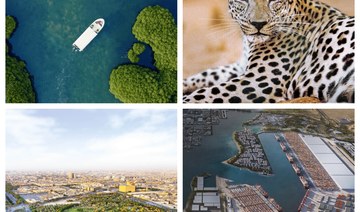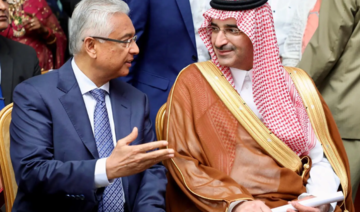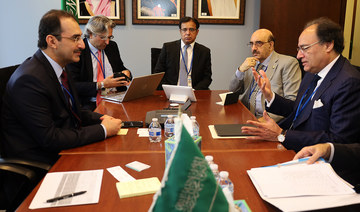LONDON: Huda Al-Rasheed’s first visit to the BBC was meant to be as a tourist enjoying a relaxed look-around. Instead, it turned into an audition for a job that transformed her into an accidental trailblazer when she became the first Saudi woman newsreader on BBC Arabic.
“It changed my life,” says Al-Rasheed.
Now, 43 years after she first uttered the words “Huna London” (“This is London“), Al-Rasheed remains a familiar voice to millions around the globe and to several generations.
Her path into broadcasting was far from smooth, however. Al-Rasheed’s father strongly opposed her ambition to work in radio — so much so that he forbade her to speak of it in public. But she ended up winning not only her father’s pride but also a place in both Saudi and broadcasting history.
But all that was far from her mind back in 1974 when Al-Rasheed arrived in London for a 10-week English-language course.
“I discovered the course organizer was married to a man who worked at the BBC so I asked if he could arrange a tour. The BBC wanted a letter from the Saudi Embassy. So I got one and because it was an official letter, the BBC invited me to spend a week with them,” she recalls.
It may not have been the intention, but it gave the BBC and Al-Rasheed the chance to have a good look at each other. At the end of the week, and only days before her return to Jeddah, she was handed a job application form.
“There was also a test which they said I could take at the British consulate,” said Al-Rasheed. “It was Ramadan and I was fasting. I went and took the test, but I didn’t tell anyone.”
She passed, but there was no promise of a job. At the time, Al-Rasheed was living with her married brother in Jeddah and trying hard to break into full-time broadcasting.
“It was my dream since childhood. The family used to call me ‘Broadcaster’ because I knew all the timings of all the programs. But whenever I said I really wanted to be a broadcaster, my father ignored me, or else he would say, ‘When I die’.”
Al-Rasheed was born and spent her earliest years in Onaza, in Najd province, north of Riyadh, but was packed off to boarding school when she was six, first to Lebanon and then to Alexandria in Egypt.
“My father valued education, but he did not think broadcasting was a suitable job because men and women worked closely together. He thought I might go astray. At the time, there were no women working for Saudi broadcasting, but I heard they were looking for someone to present an informative program about development in Saudi Arabia. My father said, ‘You can try, but you will fail.’ That made me even more determined.”
She encountered even more resistance after she got the job. “I had so many problems with jealousy from both other women and from men who didn’t think I should be there. My father was pleased. He thought it would make me give up.”
Then came a call from London, via the British embassy, with a job offer, starting immediately. But first, Al-Rasheed had to face her father, who was working in Damascus at the time.
To her amazement, he voiced no objection. “He said, ‘If your brother doesn’t mind, then I don’t mind.’”
Al-Rasheed’s brother, a pilot, had taken the same view — if their father didn’t mind, neither did he. There was nothing standing in her way, and with her father still predicting failure, she had everything to prove.
On Sept. 10, 1974, she began her new life at BBC Arabic. The training was intensive and everything about London seemed bewildering.
“I walked around with my eyes popping out of my head.” She lodged with a couple in Wimbledon, south London — “They were like parents to me” — but was desperately homesick.
“The weather was horrible, I wanted my own food and I was lonely. I spent my days off just watching television. But I never thought of going back because I was doing what I wanted to do and you have to take the rough with the smooth. For a year, it was hell. After that, I started going to the cinema, to concerts, traveling. I began to find my way.”
When her father heard her voice on the radio for the first time, all his disapproval melted away. The man who had forbidden his daughter to even speak of her ambitions now openly boasted about her. The next time Al-Rasheed visited him, they went out walking together so he could stop people in the street and introduce “my daughter who works for the BBC in London.”
She discovered that at home her father kept one of his many radio sets permanently tuned to BBC Arabic. “It was next to where he had lunch and no one was allowed to touch it,” she said.
Back at Bush House, the former headquarters of the BBC World Service and the broadcaster’s foreign language satellites, Al-Rasheed was reading and reporting the news. She covered the state visits to Britain of King Fahd of Saudi Arabia and the Sultan of Oman, and went to Buckingham Palace to report on preparations for the royal banquets.
Which did she enjoy most? “All of it,” she replied without hesitation.
The Saudi broadcasting company also tried to entice her back. “I told the head of Saudi TV that I do not cover my hair. He said, ‘You don’t have to.’ So I was the first Saudi woman to appear uncovered. But I didn’t want to stay in Riyadh. I loved my job and couldn’t live without it.”
However, she had always regretted not going to university, so in 1989 Al-Rasheed left the BBC to study for a degree in history and English literature at the University of Buckingham. She subsequently gained master’s degrees in media studies and in linguistics and translation. After graduating, she returned to BBC Arabic as a freelance.
Referring to a radio career that has spanned four decades, she said: “It’s a real blessing to be so appreciated.”
Her flat in West London is filled with beautiful rugs and books in Arabic and English. She has published three novels of her own and had a play performed.
She follows current affairs closely and is enthralled by the changes in her own homeland. Does she see herself as a role model for other would-be Saudi career women?
She shrugs. “I knew what I wanted to do and I didn’t give up. That’s what women everywhere have to do.”
Saudi trailblazer Huda Al-Rasheed’s message to women: never give up on your dreams
Saudi trailblazer Huda Al-Rasheed’s message to women: never give up on your dreams

Kingdom assumes presidency of Arab League science, education body

- Saudi Arabia pledges regional cooperation, backs Palestinian cause and cultural heritage
JEDDAH: Saudi Arabia has assumed the presidency of the Executive Council of the Arab League Educational, Cultural and Scientific Organization until 2026.
The official announcement was made on Friday during the 27th session of the ALECSO, which was held in Jeddah under the presidency of Saudi Arabia. During the session, Iraq handed over the presidency to the Kingdom.
In a speech delivered on behalf of Minister of Culture Prince Badr bin Abdullah bin Farhan, Minister of Education and Chairman of the Saudi National Committee for Education, Culture and Science Yousef Al-Benyan welcomed the ministers and heads of national committees for education and science participating in the session.
Al-Benyan stressed the Kingdom’s humanitarian and fraternal support for the Gaza Strip within the framework of Arab cooperation and solidarity.
He affirmed Saudi Arabia’s support for Khalid Anan, the only Egyptian and Arab candidate for the position of director-general of the organization.
Al-Benyan concluded the speech by praising the efforts of Arab countries in supporting ALECSO, and building bridges of communication to achieve common regional goals.
Saudi Deputy Minister of Education Mohammed Al-Sudairi confirmed that holding the ALECSO meetings in Jeddah coincides with an increase in the role of Saudi national institutions to support the work of the organization.
He added that the number of Saudi initiatives exceeded 45, reflecting Saudi Arabia’s interest and belief in the importance of working with international organizations and its regional environment.
Iraqi Minister of Education Ibrahim Al-Jabouri, head of the 26th session, pointed out achievements made in the previous session, and various programs aimed at building bridges of cooperation between Arab culture and the rest of the world.
Director General of ALECSO Mohammed Ould Omar thanked King Salman and Crown Prince Mohammed bin Salman for hosting the event in Jeddah.
He presented the most prominent programs, initiatives, and projects implemented by the organization between the 26th and 27th sessions with international organizations, such as UNESCO, the work of the Arab Summit in Algeria, the Francophone Summit, the 13th Conference of Arab Ministers of Education in Rabat, and the International Conference on Adult Education, also held in Morocco.
At the end of the 27th session, ministers and heads of the Arab delegations agreed on the importance of supporting the Palestinian cause, condemning and denouncing the displacement that the Palestinian people, as well as the destruction of Palestinian antiquities.
They also addressed the importance of supporting culture, education, innovation, and science in the Arab world.
Pakistan praises Saudi Arabia over facilitating Hajj for its nationals

- Pakistani pilgrims have been arriving in Madinah since May 9 when pre-Hajj flight operations were launched
- Pakistani minister is currently visiting Madinah to oversee Hajj arrangements for his nationals
RIYADH: Pakistani Minister of Religious Affairs and Interfaith Harmony Chaudhry Salik Hussain expressed his appreciation to Saudi Arabia for the exceptional services and facilities provided to Pakistani pilgrims who will be taking part in Hajj this year.
Minister Hussain’s remarks came in a statement delivered in Madinah, where he is currently visiting to oversee Hajj arrangements for Pakistani pilgrims, the Saudi Press Agency reported.
Pakistan has a Hajj quota of 179,210 pilgrims this year, of whom 63,805 will perform the pilgrimage under the government scheme while the rest will use private tour operators. This year’s Hajj is expected to run from June 14-19.
Pakistani pilgrims have been arriving in Madinah since May 9 when pre-Hajj flight operations were launched. Over 20,000 Pakistani pilgrims have so far arrived in Madinah under the government scheme.
The Pakistani official particularly praised the Saudi leadership for launching the Makkah Route Initiative at Karachi International Airport, mirroring the program already established at Islamabad International Airport.
Hussain said he was confident the initiative would be extended to Lahore Airport in the coming year.
KSrelief continues aid projects in Sudan, Yemen and Greece

- 26 neurosurgeries were done in Sudan
- 330 relief trucks delivered 5,752 tonnes of aid to Yemen
RIYADH: The Kingdom’s aid agency KSrelief continued its projects in Sudan, Yemen, and Greece.
In Sudan, KSrelief implemented a medical volunteer project for neurosurgery and spine surgery from May 12 to May 17.
About 15 volunteer specialists from various medical fields assisted in performing 26 surgeries, the Saudi Press Agency reported.
In Yemen, KSrelief provided a convoy of 330 relief trucks, which delivered over 5,752 tonnes of critical supplies to people across 14 Yemeni governorates.
The aid included food, medical supplies, and shelter materials.
Additionally, KSrelief donated 10 tonnes of dates to Greece, which were presented by Saudi Ambassador to Greece Saad Al-Ammar to Athens.
How forest conservation is helping Saudi Arabia achieve its green objectives

- By planting trees and protecting forests, the Kingdom promotes biodiversity and sustainable development
- Forests provide habitats for hundreds of animal species and play a pivotal role in combating climate change
JEDDAH: With its low annual rainfall, much of Saudi Arabia’s vast landscape is covered by desert, broken by occasional oases. In its mountainous regions, valleys, and along its coastline, however, the Kingdom is home to multiple forest ecosystems.
Forests play a pivotal role in combating climate change by acting as carbon sinks — storing carbon both above and below ground, thereby extracting it from the atmosphere, where it would otherwise contribute to the greenhouse effect.
Their significance in climate change adaptation and mitigation is also underscored by their role in creating local microclimates, providing habitats for a wealth of biodiversity, locking in freshwater resources, and preventing flash floods, landslides, and soil degradation.
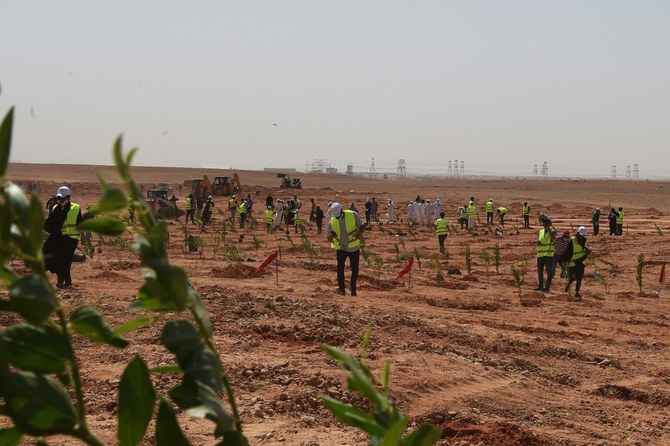
Saudi Arabia’s National Center for Vegetation Cover Development and Combating Desertification is at the forefront of implementing the Kingdom’s strategic goals outlined in Vision 2030.
“Forests play a crucial role in mitigating climate change,” Samir Malaika, assistant director-general of the general administration of forests at NCVC told Arab News. “Saudi Arabia’s dry climate and geography hinder its efforts to conserve forests and promote plant growth.
“With most areas receiving minimal rainfall, forests struggle to thrive. The escalating impact of climate change exacerbates environmental stressors, hampering forest growth and regeneration efforts.”
The NCVC aims to elevate living standards by reducing pollution and facilitating the restoration of degraded environments. It is also committed to building resilience against natural hazards and defenses against harmful pests that could pose risks to vegetation.

Simultaneously, it prioritizes the sustainable development of the Kingdom’s natural resources. With seven ongoing initiatives, it aims to ensure the responsible and lasting utilization of resources in line with the nation’s sustainability objectives.
Among the center’s key initiatives under the Saudi Green Initiative is a scheme to plant some 10 billion trees — representing a significant step in the Kingdom’s reforestation effort.
The initiative for forest management and sustainable development by 2030 underscores a long-term commitment to nurturing and preserving woodland environments.
The phased approach to preserving and restoring vegetation in pasture areas reflects a strategic focus on addressing the specific ecological challenges faced by different ecosystems.
Opinion
This section contains relevant reference points, placed in (Opinion field)
Furthermore, the initiative for developing vegetation and infrastructure for 50 national parks highlights the importance of creating protected natural spaces while promoting biodiversity and ecotourism.
Moreover, the initiative to plant 7 million wild trees in royal reserves demonstrates a targeted effort to enhance the natural habitats within these pristine areas.
Engagement by the public and private sectors in vegetation development and combating desertification underscores the collaborative approach needed in order to achieve sustainable environmental goals.

By harnessing the collective resources and expertise of various stakeholders, these initiatives aim to create a resilient and thriving ecosystem that benefits both present and future generations.
According to Malaika, Saudi Arabia boasts a forest coverage spanning approximately 2,768,050 hectares, primarily concentrated in the southern and southwestern regions, along riverbeds, and on the coastlines of the Red Sea and the Arabian Gulf.
These forest ecosystems are categorized into three primary types: mountain, valley, and mangrove.
Mountain forests
Mountain forests are predominantly located in the region spanning the Hijaz Mountains in Taif to Jazan in the south. These areas have neutral soil acidity and receive the highest rainfall and humidity levels, particularly evident in the southwest with denser forest cover.
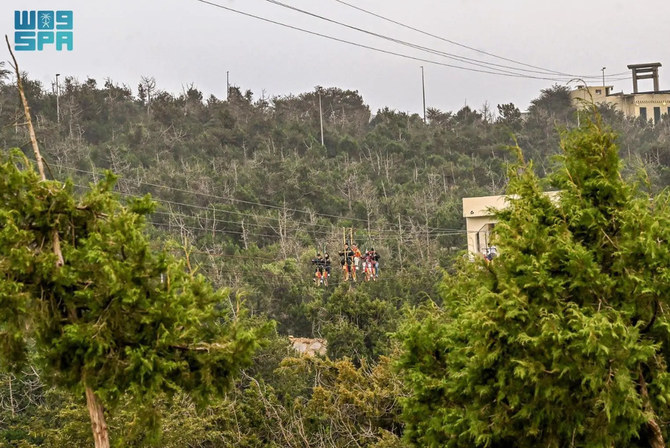
Forests are made up of several Juniperus plant species, typically found at altitudes of 2,000 meters and above. Additionally, Olea chrysophylla forests, characterized by wild olive trees with golden leaves, thrive at altitudes of 1,500 to 2,000 meters.
At lower altitudes, between 1,000 to 1,500 meters, Acacia plant species dominate the landscape.
Notably, terraced agriculture is a common feature of mountainous regions, facilitating crop fruit tree cultivation while aiding in water retention and soil protection. However, improper management can lead to land degradation, adversely affecting the surrounding forests.
DID YOUKNOW?
• Saudi Arabia is home to more than 63 unique ecosystems, ranging from mountainous regions to coastal lowlands.
• The Kingdom boasts a diverse array of wildlife, including 78 terrestrial mammal species and 499 species of bird.
• Coral reefs in Saudi Arabian waters host an impressive 266 species, contributing to marine biodiversity.
• With more than 6,500 species, Saudi Arabia’s invertebrate population testifies to the richness of its ecosystems.
• Saudi Arabia boasts three distinct forest ecosystems: mountain forest, valley forest, and mangrove forest.
Valley forests
Saudi Arabia’s topography features 179 valleys distributed across the country. Valley forests, mainly situated in semi-arid regions, are characterized by species such as Acacia ehrenbergiana, Acacia tortilis, Maerua crassifolia, several species of Commiphora, and Salvadora persica.
Additionally, oases and valleys are abundant with various Acacia species, Ziziphus spina-christi, Salvadora persica, Haloxylon persicum, trees, shrubs, and Hyphaene thebaica.
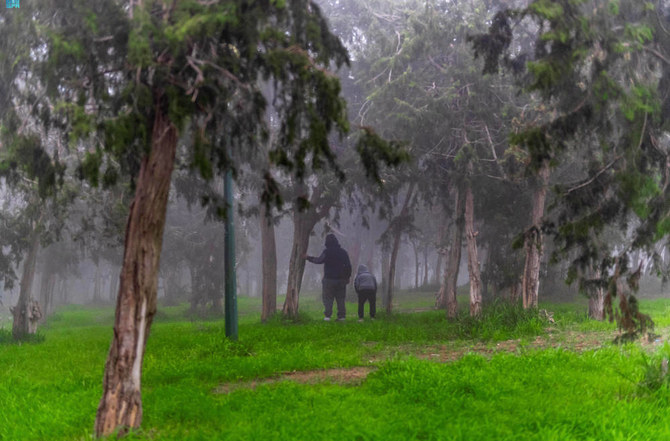
Mangrove forests
Mangroves and coastal ecosystems tolerant to saltwater are predominantly located along the Red Sea coast, with other stretches found along the Arabian Gulf coast.
Despite the lack of comprehensive forest data, studies indicate significant degradation of the mangrove ecosystem.
Avicennia marina is the most prevalent species in mangrove forests, with Rhizophora mucronata being less common.

Besides these natural forests, the Kingdom is also host to many urban and cultivated woodlands in its parks and residential neighborhoods, planted to provide shade, reduce temperatures, and beautify city streets.
Despite the Kingdom’s diverse ecosystems, it faces significant challenges in preserving and expanding its forests, including limited resources, poor local management, insufficient nursery production to meet seedling demand, a lack of awareness about dumping and unauthorized grazing, and other irresponsible human activities.
The Saudi National Center for Wildlife is working to protect, develop, and restore ecosystems and biodiversity around the Kingdom, in addition to addressing risks related to plant and animal life.
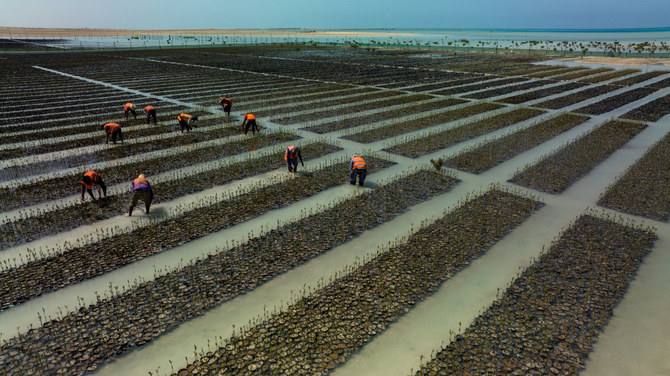
According to Abdulmanea Al-Qahtani, invertebrates department director at the NCW, the Kingdom has 63 distinct ecosystems, encompassing a diverse range of landscapes, including mountains, plains, deserts, valleys, forests, seas, wetlands, plateaus, coastal areas, and marshes, all teeming with biodiversity.
The Kingdom is home to 78 species of terrestrial mammal, 499 species of bird, 136 species of reptile, seven species of amphibian, and more than 6,500 species of invertebrate.
In its waters, the Kingdom also offers habitats to 19 species of marine mammal, eight species of freshwater fish, 1,248 species of saltwater fish, and 266 species of coral
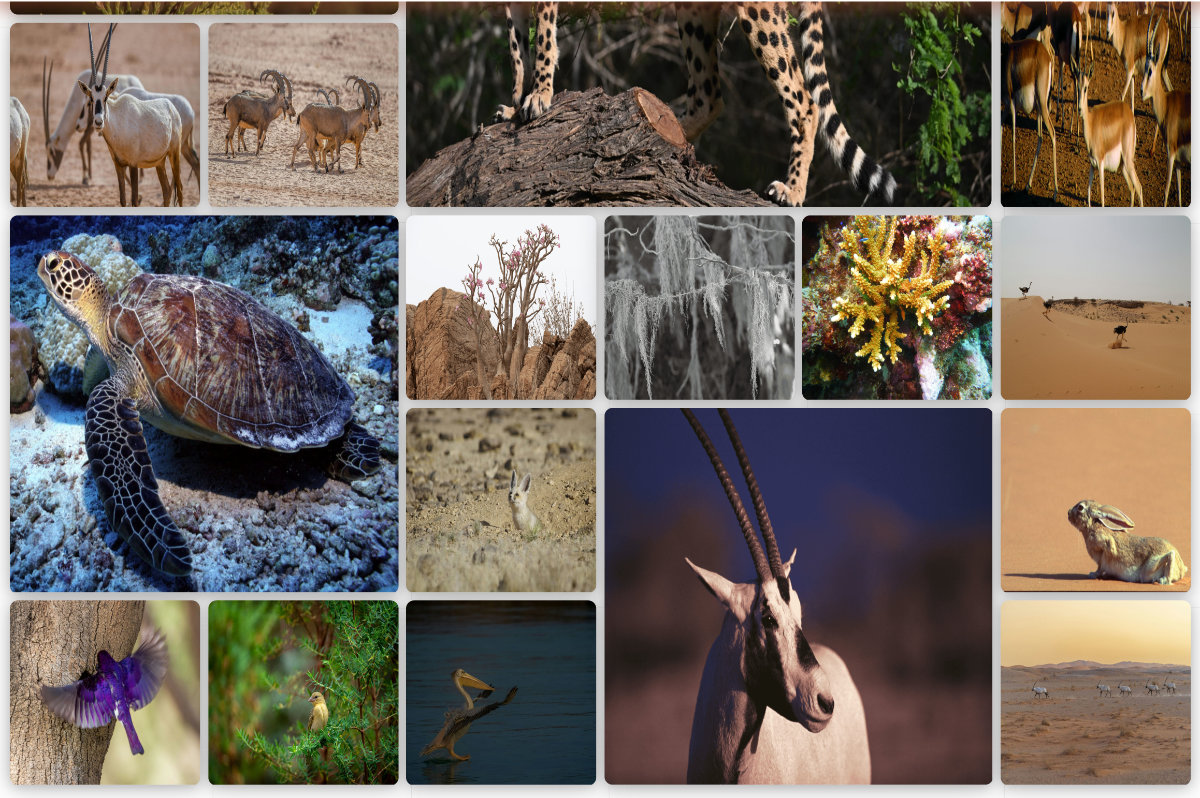
The Saudi Green Initiative, launched by Crown Prince Mohammed bin Salman in 2021 under the Vision 2030 framework, aims to tackle threats to this rich biodiversity and foster sustainable development.
Key goals include transitioning to a sustainable economy by reducing carbon emissions, boosting renewable energy production, and bolstering conservation efforts.
Additionally, the initiative aims to enhance environmental protection, promote green technologies, and create green jobs to drive economic diversification and growth.

Saudi fund signs two loan agreements, inaugurates Hulhumale Island development in Maldives

- Al-Marshad participated in the partial inauguration of the Hulhulmale Island Development Project
MALE: CEO of the Saudi Fund for Development Sultan bin Abdulrahman Al-Marshad signed on Friday two development loan agreements with the Maldives’ Minister of Finance Dr. Mohammed Shafiq. These agreements will contribute to financing the Velana International Airport development project with a value of $100 million and the healthcare sector development project in the Maldives with a value of $50 million, provided by fund.
Additionally, Al-Marshad participated in the partial inauguration of the Hulhulmale Island Development Project, which the SFD is contributing to financing through a soft development loan worth $80 million. The event was also attended by Saudi Ambassador to the Maldives Matrek bin Abdullah Al-Ajalin.



